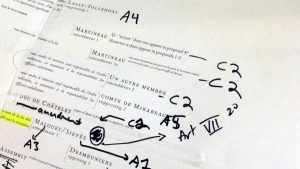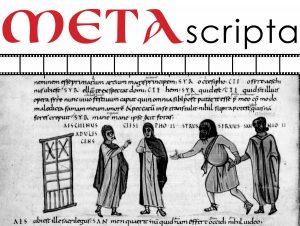Spring 2018 Public Lecture Series
Emory University, Atlanta
All public lectures will begin at 5.30 PM and take place in the Woodruff Library Jones Room.
Thursday, 1 February
Design for Humanistic Inquiry
 In the last decade, the use of software tools for data analysis and data visualization has proliferated in the humanities. The availability of digitized material, increasing computational power, and analytical techniques adopted from network science, geospatial analysis, and natural language processing have inspired new ways to interrogate cultural heritage data. But those tools, reliant on statistical modeling, also limit the questions we can ask and the meaning we discover. In order to uncover significance in materials that have passed through many hands, and stories that have been telegraphed by different voices inflected with opinion, argument, and perspective, we need tools that support human-scale exploration of complex systems. The research process requires “thinking through data,” which is how we describe the reflective, slow collecting and editing of information, as distinct from the quick, mechanistic, algorithmic approach to data processing. This talk will demonstrate how the requirements of humanistic inquiry are encoded in tools developed at Humanities + Design and why, in this age of artificial intelligence, it is so important to capture the intellectual work of data modeling.
In the last decade, the use of software tools for data analysis and data visualization has proliferated in the humanities. The availability of digitized material, increasing computational power, and analytical techniques adopted from network science, geospatial analysis, and natural language processing have inspired new ways to interrogate cultural heritage data. But those tools, reliant on statistical modeling, also limit the questions we can ask and the meaning we discover. In order to uncover significance in materials that have passed through many hands, and stories that have been telegraphed by different voices inflected with opinion, argument, and perspective, we need tools that support human-scale exploration of complex systems. The research process requires “thinking through data,” which is how we describe the reflective, slow collecting and editing of information, as distinct from the quick, mechanistic, algorithmic approach to data processing. This talk will demonstrate how the requirements of humanistic inquiry are encoded in tools developed at Humanities + Design and why, in this age of artificial intelligence, it is so important to capture the intellectual work of data modeling.
Nicole Coleman is Digital Research Architect for the Stanford University Libraries and consultant for the Stanford University Press’s Digital Publications project. Nicole is also co-founder and Research Director for Humanities + Design, a research lab at Stanford’s Center for Spatial and Textual Analysis dedicated to encoding humanistic method into open source software for research. She is currently developing an initiative to make library collections more useful to researchers through applications of artificial intelligence.
Monday, 16 April
METAscripta: Continuing a Legacy of Shared Cultural Heritage
 Although many Vatican manuscripts have enjoyed a long history of dedicated scholarship, others remain unstudied by scholars who have no way of knowing that the manuscripts even exist. METAscripta, meaning “metadata about manuscripts,” is a large-scale digital humanities project of the Knights of Columbus Vatican Film Library (VFL) in the Department of Special Collections of Pius XII Memorial Library. The immediate goal of the project is to digitize 37,000 pre-modern manuscripts originally photographed on microfilm at the Biblioteca Apostolica Vaticana (BAV) in the 1950s by the founders of the VFL. The project will ultimately produce a website where registered users will be able to search BAV manuscripts using discovery tools rather than conventional catalog descriptions, which are lacking for tens of thousands of Vatican manuscripts.
Although many Vatican manuscripts have enjoyed a long history of dedicated scholarship, others remain unstudied by scholars who have no way of knowing that the manuscripts even exist. METAscripta, meaning “metadata about manuscripts,” is a large-scale digital humanities project of the Knights of Columbus Vatican Film Library (VFL) in the Department of Special Collections of Pius XII Memorial Library. The immediate goal of the project is to digitize 37,000 pre-modern manuscripts originally photographed on microfilm at the Biblioteca Apostolica Vaticana (BAV) in the 1950s by the founders of the VFL. The project will ultimately produce a website where registered users will be able to search BAV manuscripts using discovery tools rather than conventional catalog descriptions, which are lacking for tens of thousands of Vatican manuscripts.
More than just a digitization effort, the METAscripta project applies innovative cataloging methods to improve access to Vatican manuscripts, including indexing by language, century, and country of origin. This basic metadata will allow users to search for manuscripts as historical artifacts without the traditional library access points of author/title, which for ancient manuscripts require the work of experts who must not only read pre-modern languages, but also decipher elaborate book-hands and idiosyncratic scripts. In addition, controlled vocabulary crowd-sourcing will further enable scholars to add to this discovery metadata by contributing information about manuscripts in their area of expertise. The result will be a new working environment for interactive and shared scholarship about Vatican manuscripts, based on relationships between the Vatican and American scholars that began over 60 years ago.
Debra Taylor Cashion is Digital Humanities Librarian and Assistant Librarian of the Knights of Columbus Vatican Film Library at Saint Louis University in St. Louis, Missouri. She holds a PhD in art history from the University of California, Berkeley, and an MLIS from the University of Pittsburgh. A specialist in medieval and early modern manuscripts, she currently serves as President and Executive Director of Digital Scriptorium, a consortium of American libraries and museums with collections of pre-modern manuscripts. Debra also creates projects to develop digital resources for manuscript studies, including Broken Books and METAscripta. She recently co-edited and contributed to a large anthology of articles entitled The Primacy of the Image in Northern European Art, 1400-1600: Essays in Honor of Larry Silver (Brill, 2017), part of a series in art history edited by Emory colleague Walter Melion. She has also published articles about her work in Digital Philology, Manuscript Studies, and the Journal of Historians of Netherlandish Art.